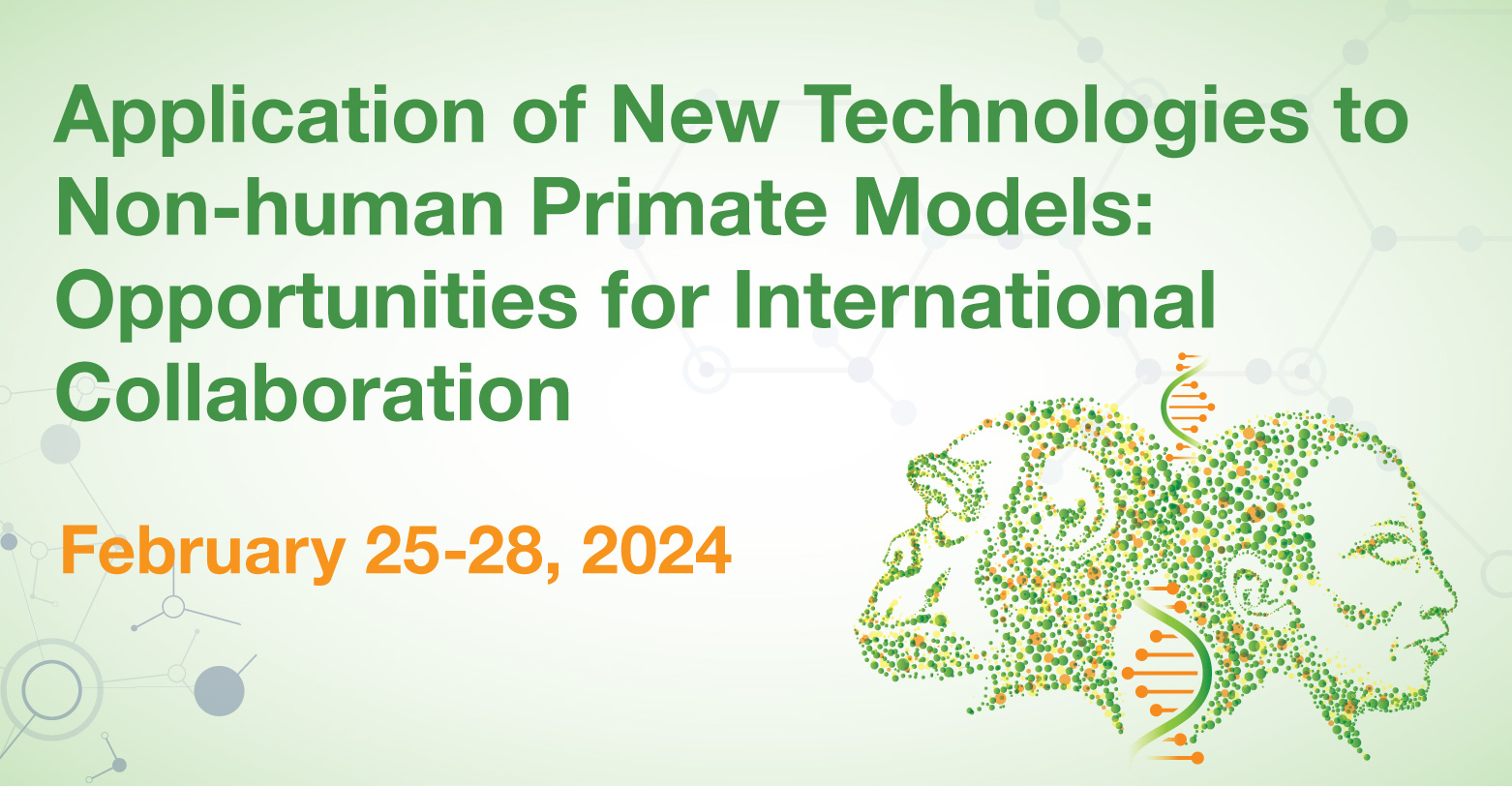Schedule
(Updated as of February 24, 2024)
Important notes:
| 1. | This program will be held in face-to-face mode. |
| 2. | Unauthorized recording of any session is prohibited. |
| 3. | Please obtain the consent from the speaker concerned for any adaptation/sharing of his/her presentation materials. |
| Should you have further enquiries, please feel free to contact the secretariat by email at iasantnhp@ust.hk. | |
Venue: Kaisa Group Lecture Theater (IAS LT), G/F, Lo Ka Chung Building, Lee Shau Kee Campus, HKUST
February 25, 2024 (Sun)
Time
Event
| 14:00 - 17:00 | Check-in & Registration |
| 16:00 - 17:00 | Reception |
| 17:00 - 17:05 |
Welcoming Remarks Nancy IP (The Hong Kong University of Science and Technology) |
| 17:05 - 17:10 |
Speaker Introduction Aaron D. GITLER (Stanford University) |
| 17:10 – 18:10 |
Keynote Lecture: Non-human Primate Studies of Cognition and Brain Diseases Mu-ming POO (Institute of Neuroscience, Chinese Academy of Sciences) |
| 18:10 – 18:30 | Break and Poster Set-up |
| 18:30 – 19:30 | Poster Viewing |
| 19:30 – 21:00 | Dinner (By Invitation; Conference Lodge) |
February 26, 2024 (Mon)
Time
Event
|
Session 1 — National Brain Projects Session Chair: Steven HYMAN (Harvard University and Broad Institute) |
||
| 08:30 - 09:30 |
D2-#1: Brain/MINDS: A Japanese National Brain Project for Marmoset Neuroscience Hideyuki OKANO (Keio University) |
|
| 09:30 - 10:00 |
D2-#2: The NIH BRAIN Initiative: Accelerating Discovery Towards Cures John NGAI (U.S. National Institute of Health Brain Initiative) |
|
| 10:00 - 10:30 |
D2-#3: Priorities in Mental Health Research: Applications of Non-human Primate Models Joshua A. GORDON (U.S. National Institute of Mental Health) |
|
| 10:30 - 10:45 | Group Photo and Break | |
|
Session 2 — Macaque I Session Chair: Peter STRICK (University of Pittsburgh) |
||
| 10:45 - 11:15 |
D2-#4: Functional and Comparative Neuroanatomy of Interoception Henry C. EVRARD (Institute of Neuroscience, Chinese Academy of Sciences) |
|
| 11:15 - 11:45 |
D2-#5: Rhesus Macaques as a Model of the Neurobiology of Human Social Behavior, Resilience, and Vulnerability Michael L. PLATT (University of Pennsylvania) |
|
| 11:45 - 12:15 |
D2-#6: Dissect the Corticostriatal Circuits for Action Sequencing Xin JIN (East China Normal University) |
|
| 12:15 - 12:45 |
D2-#7: Macaque Monkey Models for Vision and Visual Development J. Anthony MOVSHON (New York University) |
|
| 12:45 - 14:15 | Lunch (By Invitation; IAS Lounge, 5/F, Lo Ka Chung Building) | |
|
Session 3 — Marmoset I Session Chair: Marlene COHEN (University of Chicago) |
||
| 14:15 - 14:45 |
D2-#8: Cross-Species Omics Convergence: Valproate-Exposed Marmosets Illuminate Human Autism Spectrum Disorders Noritaka ICHINOHE (National Center for Neurology and Psychiatry, Japan) |
|
| 14:45 - 15:15 |
D2-#9: Genetically Engineered Marmoset Models for Brain Disorder Research Guoping FENG (Massachusetts Institute of Technology) |
|
| 15:15 - 15:45 |
D2-#10: Marmoset as a Model for Studying the Neural Basis of Social Communication Xiaoqin WANG (John Hopkins University) |
|
| 15:45 - 16:15 |
D2-#11: Studying Higher Brain Functions Using Non-human Primates Neng GONG (Institute of Neuroscience, Chinese Academy of Sciences) |
|
| 16:15 - 16:30 | Break | |
|
Session 4 — Macaque II Session Chair: Michele A. BASSO (Washington National Primate Research Center) |
||
| 16:30 - 17:00 |
D2-#12: Neural Mechanisms to Anticipate Success by the Self for Future Decision Making in Humans and Macaques Kentaro MIYAMOTO (RIKEN Center for Brain Science) |
|
| 17:00 - 17:30 |
D2-#13: The Control of Sequence Working Memory in Macaque Frontal Cortex Liping WANG (Institute of Neuroscience, Chinese Academy of Sciences) |
|
| 17:30 - 18:00 |
D2-#14: From Bedside to Bench and Back Again in a Macaque Model of Alzheimer's Disease Marlene COHEN (The University of Chicago) |
|
| 18:00 - 18:15 | Break | |
| 18:15 - 18:20 |
Speaker Introduction Hannah CLARKE (University of Cambridge) |
|
| 18:20 - 19:20 |
Keynote Lecture: The Functional Organization of Emotion Regulation: Chemogenetic and Neuroimaging Insights from Marmoset Prefrontal Cortex Angela ROBERTS (University of Cambridge) |
|
| 19:20 - 21:00 | Dinner (By Invitation; Conference Lodge) | |
February 27, 2024 (Tue)
Time
Event
|
Session 5 - Technological Developments Session Chair: John NGAI (U.S. National Institute of Health Brain Initiative) |
||
| 08:40 - 09:10 |
D3-#1: Human and Non-human Primate Brain Cell Atlases and Their Application to Disease Research Ed LEIN (Allen Institute) |
|
| 09:10 - 09:40 |
D3-#2: Hierarchical Organization in Spatial Distribution and Functions of Various Cells in the Macaque Brain Chengyu Tony LI (Lin Gang Laboratory) |
|
| 09:40 - 10:10 |
D3-#3: Understand Molecular and Cellular Basis of the Brain by High-resolution Panoramic Spatial Transcriptomics Longqi LIU (Beijing Genomics Institute) |
|
| 10:10 - 10:30 | Break | |
|
Session 6 — Macaque III Session Chair: Henry C. EVRARD (Institute of Neuroscience, Chinese Academy of Sciences) |
||
| 10:30 - 11:00 |
D3-#4: The Spatiotemporal Properties of Visual Receptive Field Remapping Around Saccades in Macaque's LIP and FEF Mingsha ZHANG (Beijing Normal University) |
|
| 11:00 - 11:30 |
D3-#5: The Brian-body Connection: Networks that Enable the ‘Brain’ (Cerebral Cortex and Cerebellum) to Influence the Body’ (Adrenal Medulla) Peter STRICK (University of Pittsburgh) |
|
| 11:30 - 12:00 |
D3-#6: Challenges for Multisensory Integration in Self-motion Perception Yong GU (Institute of Neuroscience, Chinese Academy of Sciences) |
|
| 12:00 - 12:30 |
D3-#7: Mesoscale Mapping of the Primate Brain with High-speed 3D Imaging at Micron Resolution Guoqiang BI (Shenzhen Institute of Advanced Study, Chinese Academy of Sciences) |
|
| 12:30 - 14:00 | Lunch (By Invitation; IAS Lounge, 5/F, Lo Ka Chung Building) | |
| 14:00 - 14:30 |
D3-#8: The Role of the Macaque Superior Colliculus in Decision Making Michele A. BASSO (Washington National Primate Research Center) |
|
| 14:30 - 15:00 |
D3-#9: Development of Nonhuman Primate Models and Therapeutic Strategies for Brain Disorders Zhonghua LU (Shenzhen Institute of Advanced Technology, Chinese Academy of Sciences) |
|
| 15:00 - 15:20 | Break | |
|
Session 7 — Marmoset II Session Chair: Guojun BU (The Hong Kong University of Science and Technology) |
||
| 15:20 - 15:50 |
D3-#10: Investigation of Human Brain Evolution and Neurodevelopmental Disorders Using Genetically-modified Marmosets Hideyuki OKANO (Keio University) |
|
| 15:50 - 16:20 |
D3-#11: Single Cell Sequencing to Reveal Influence of Evolution and Development on Primate Brain Cell Type Identity Fenna M. KRIENEN (Princeton University) |
|
| 16:20 - 16:50 |
D3-#12: Development of Alzheimer's Model Marmoset and Its Evaluation System Erika SASAKI (Keio University) |
|
| 16:50 - 17:20 |
D3-#13: Intrinsic Traveling Waves and Visual Perception John REYNOLDS (The Salk Institute for Biological Studies) |
|
| 17:20 - 17:50 |
D3-#14: Mapping the Neural Circuitry of Predator Fear Cross Species Liping WANG (Shenzhen Institute of Advanced Technology, Chinese Academy of Sciences) |
|
| 17:50 - 18:10 | Break | |
| 18:10 - 18:15 |
Speaker Introduction Joshua A. GORDON (U.S. National Institute of Mental Health) |
|
| 18:15 - 19:15 |
Keynote Lecture: Investigation of Brain Disorders Requires Integration across Model Systems: the Key Role of NHPs Steven HYMAN (Harvard University and Broad Institute) |
|
| 19:45 - 21:30 |
Banquet (By Invitation) Shuttle Departure Time: 19:25 |
|
February 28, 2024 (Wed)
Time
Event
|
Session 8 - Human-NHP Interface Session Chair: Joshua A. GORDON (U.S. National Institute of Mental Health) |
||
| 08:40 - 09:10 |
D4-#1: Belief Embodiment through Eye Movements Facilitates Memory-guided Navigation Dora ANGELAKI (New York University) |
|
| 09:10 - 09:40 |
D4-#2: On Knowledge and Tool Processing in Humans and NHPs: Similarities and Tentative Differences Yanchao BI (Beijing Normal University) |
|
| 09:40 - 10:10 |
D4-#3: Modelling Schizophrenia in the Marmoset Monkey: Perineuronal Nets and Hippocampal-prefrontal Communication Hannah CLARKE (University of Cambridge) |
|
| 10:10 - 10:30 | Break | |
|
Leadership and Audience Discussion: Next Step Moderator: J. Anthony MOVSHON (New York University) |
||
| 10:30 – 12:00 |
Panel Discussion Mu-ming POO (Institute of Neuroscience, Chinese Academy of Sciences) Angela ROBERTS (University of Cambridge) John NGAI (U.S. National Institute of Health Brain Initiative) Joshua A. GORDON (U.S. National Institute of Mental Health) Hideyuki OKANO (Keio University) Ed LEIN (Allen Institute) |
|
| 12:00 | Lunch (By Invitation; IAS Lounge, 5/F, Lo Ka Chung Building) & Departure | |




